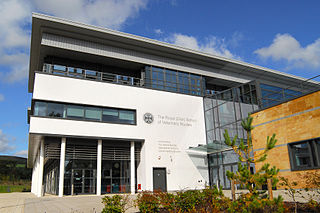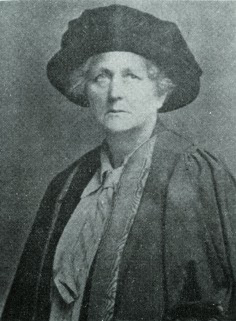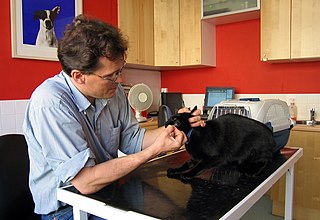
Veterinary medicine is the branch of medicine that deals with the prevention, management, diagnosis, and treatment of disease, disorder, and injury in non-human animals. The scope of veterinary medicine is wide, covering all animal species, both domesticated and wild, with a wide range of conditions that can affect different species.

A veterinarian (vet) or veterinary surgeon is a medical professional who practices veterinary medicine. They manage a wide range of health conditions and injuries in non-human animals. Along with this, veterinarians also play a role in animal reproduction, health management, conservation, husbandry and breeding and preventive medicine like nutrition, vaccination and parasitic control as well as biosecurity and zoonotic disease surveillance and prevention.
The University of California, Davis, School of Veterinary Medicine is the largest veterinary school in the United States. Established in 1948, the school is the primary health resource for California's animal populations. In 2020, the school was again ranked first in the United States by U.S. News & World Report and in 2022, ranked second in the world by QS World University Rankings. The school is located in the southwest corner of the main campus of the University of California, Davis. The current dean of veterinary medicine is Dr. Mark Stetter.
The Royal College of Veterinary Surgeons (RCVS) is the regulatory body for veterinary surgeons in the United Kingdom, established in 1844 by royal charter. It is responsible for monitoring the educational, ethical and clinical standards of the veterinary profession. Anyone wishing to practice as a vet in the United Kingdom must be registered with the RCVS.

Carprofen is a nonsteroidal anti-inflammatory drug (NSAID) of the carbazole and propionic acid class that was previously for use in humans and animals but is now only available to veterinarians for prescribing as a supportive treatment for various conditions in animals. Carprofen reduces inflammation by inhibition of COX-1 and COX-2; its specificity for COX-2 varies from species to species. Marketed under many brand names worldwide, carprofen is used as a treatment for inflammation and pain, including joint pain and postoperative pain.

Veterinary education is the tertiary education of veterinarians. To become a veterinarian, one must first complete a degree in veterinary medicine Doctor of Veterinary Medicine.

The Royal (Dick) School of Veterinary Studies, commonly referred to as the Dick Vet, is the University of Edinburgh's vet school. It is part of the College of Medicine and Veterinary Medicine.
The Student American Veterinary Medical Association (SAVMA) is a national association of student chapters of the American Veterinary Medical Association (AVMA) at schools and colleges of veterinary medicine in the United States, Canada and the Caribbean. SAVMA acts as a single national voice for veterinary students in accordance with the policies and goals of the AVMA, coordinates AVMA student chapter activities, facilitates the exchange of information, and represents the interests of student veterinarians within AVMA, the veterinary profession and in the political and legislative arenas nationally.

Veterinary oncology is a subspecialty of veterinary medicine that deals with cancer diagnosis and treatment in animals. Cancer is a major cause of death in pet animals. In one study, 45% of the dogs that reached 10 years of age or older died of cancer.
The Bachelor of Veterinary Science, "Bachelor of Veterinary Medicine" (BVetMed), or "Bachelor of Veterinary Medicine and Surgery" is a degree for studies in veterinary medicine in the United Kingdom, Australia, and several other countries outside the United States and Canada. These degrees qualify one to practice as a veterinarian in the US if the degree is conferred from an American Veterinary Medical Association (AVMA) accredited school and the candidate passes the North American Veterinary Licensing Examination (NAVLE), just as any other US and Canada graduate. They are equivalent to DVM/VMD degrees; the main equalizer being licensure in the US. On 5 March 2015, the Royal College of Veterinary Surgeons (RCVS) Council made the decision to allow UK veterinarians to use the courtesy title "doctor", to align with international practices. The RCVS president said of the change: “Whether one regards the decision as correcting a historical anomaly or simply providing greater clarity at home and abroad, there is no doubt that the issue has generated huge interest".
Ross University School of Veterinary Medicine (RUSVM), founded in 1982, is a university offering the Doctor of Veterinary Medicine degree. As of 2014, RUSVM began offering Master of Science and PhD degrees in public health, global animal health, conservation medicine, and other research areas supported by the school. The school is located in St. Kitts. Administrative offices are located in Downers Grove, IL. RUSVM is accredited by the American Veterinary Medical Association Council on Education.
The Faculty of Veterinary Science is a faculty of the University of Pretoria. Founded in 1920, it is the second oldest veterinary faculty in Africa. With the exception of the faculties in Khartoum, and Cairo, all the other African faculties were established after 1960. It is the only one of its kind in South Africa and is one of 33 veterinary faculties in Africa.

Aleen Isobel Cust was an Anglo-Irish veterinary surgeon. She was born and began her career in Ireland. In 1922 she became the first female veterinary surgeon to be recognised by the Royal College of Veterinary Surgeons.
Veterinary ethics is a system of moral principles that apply values and judgments to the practice of veterinary medicine. As a scholarly discipline, veterinary ethics encompasses its practical application in clinical settings as well as work on its history, philosophy, theology, and sociology. Veterinary ethics combines veterinary professional ethics and the subject of animal ethics. The subject of veterinary ethics can be interpreted as an extension of critical thinking skills necessary to make the decisions in veterinary care in order to support the profession's responsibilities to animal kind and mankind. Five main topics construct the physical usage of Veterinary Ethics. The first is history which describes how these ethics came to be, and how they have changed in the modernization of the veterinary industry. The second is the relation veterinary ethics has with human medical ethics, which together share many values. Third, the principles of these ethics which are updated regularly by the AVMA. Fourth are the key topics of veterinary ethics, which describe what these ethics cover. Last, how these ethics are incorporated into everyday practice and also how they affect those employed in the industry.

Veterinary medicine in the United Kingdom is the performance of veterinary medicine by licensed professionals. It is strictly regulated by the statute law, notably the Veterinary Surgeons Act 1966. Veterinary medicine is led by veterinary physicians, termed "veterinary surgeons", normally referred to as "vets".

The Museum of Veterinary Anatomy is a museum open to the public at the Faculty of Veterinary Medicine and Animal Science (FMVZ) at the University of São Paulo (USP), Brazil. It was named in honor of Professor Plinio Pinto e Silva, veterinarian and member of the São Paulo Veterinary Medicine Academy, a pioneer in obtaining the associate professor title at the Faculty of Veterinary Medicine of USP. The museum was opened to visitors in 1984 and has a permanent exhibition, studied and curated by teachers, professionals and students of the faculty. Before the museum was opened to visitors, the collection was used by college teachers in their classes. Between 2004 and 2008, the MAV was closed to visitors for the transfer of FMVZ headquarters to USP's college campus.
The Evidence-Based Veterinary Medicine Association (EBVMA) is an international, non-profit professional organization with the mission of better organizing the emerging veterinary research, training, and practice of evidence-based veterinary medicine (EBVM)—the formal strategy to integrate the results of the best critically-designed and statistically-evaluated research available with clinical expertise and the unique needs or wishes of each client in clinical practice. EBVM draws from and parallels the evidence-based medicine movement in human medicine.
David Argyle BVMS DECVIM-CA (Oncology) FRSE FRSA FRCVS is Head of the College of Medicine and Veterinary Medicine at the University of Edinburgh.

The Faculty of Veterinary Sciences, also simply known as Veterinaria, is a faculty of the University of Buenos Aires (UBA), the largest university in Argentina. It was founded as an autonomous faculty in 1972, when it was split from the Faculty of Agronomy and Veterinary Sciences, which was originally founded in 1904 as the Instituto Superior de Agronomía y Veterinaria.











